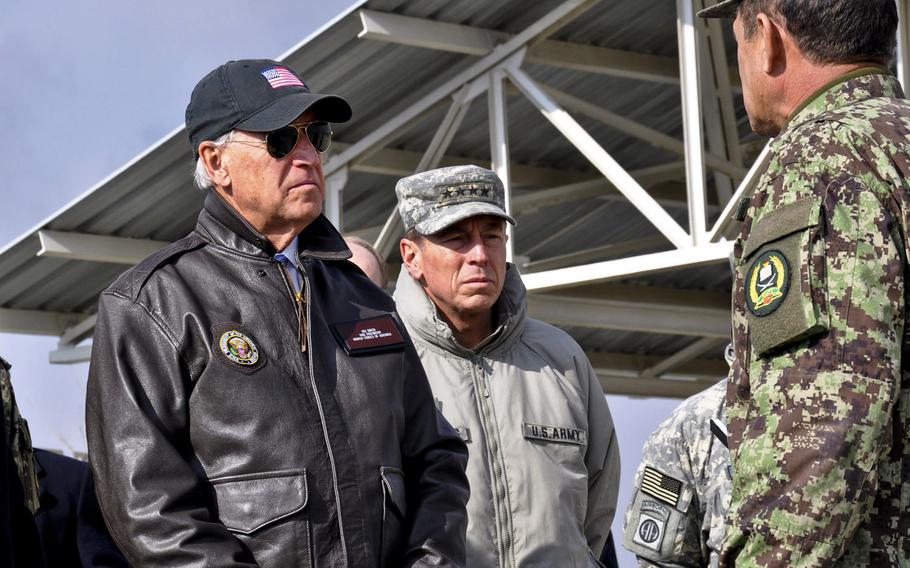
In a 2011 visit to Afghanistan, then-Vice President Joe Biden listens to Afghan Brig. Gen. Amlaqullah Patyani, commander of Kabul Military Training Center. In the center is Gen. David Petraeus, then the commander of the International Security Force. As president, Biden must determine whether to soon withdraw all U.S. troops from Afghanistan. (Defense Department)
KABUL, Afghanistan — President Joe Biden faces a choice in the opening days of his administration that will one day help shape his legacy: whether to soon withdraw all U.S. troops from Afghanistan or pursue a longer mission.
The former risks undercutting the Kabul government’s leverage as it continues to fight both the Taliban and the local Islamic State affiliate, analysts and Afghan officials say; the latter may stabilize the government and protect U.S. interests, but recharge hostilities between the Taliban and coalition troops.
Peace negotiations between the Afghan government and Taliban insurgents have made little progress recently because both sides are gauging how the new administration will approach the war, analysts say.
Biden’s Defense and State Department nominees have both said they want to review the deal signed by the Trump administration and the Taliban in February in Doha, Qatar.
The U.S. officially had 8,400 troops in Afghanistan when former President Donald Trump took office. His administration raised that number to 14,000 in its first year, before reducing it to 2,500 since the Doha agreement.
Under the accord, Washington agreed to withdraw its troops in return for Taliban concessions. But peace talks and prisoner exchanges between Kabul and the insurgents required by the deal were met with months of delays.
“We have to look carefully at what has actually been negotiated,” Antony Blinken, nominee for secretary of state, said Tuesday at his Senate confirmation hearing.
Lloyd Austin, Biden’s pick to head the Pentagon, echoed concerns by senior military leaders about a surge of violence across the country and whether the Taliban have kept their promises.
“If confirmed, I intend to consult with interagency stakeholders to review the Taliban’s actions relative to all its commitments,” Austin said in a written statement during his confirmation hearing Tuesday.
The Biden administration is expected to reemphasize the need for a “responsible” withdrawal, but it’s hard to imagine all American troops withdrawing by May, a report released last week by International Crisis Group said.
A full withdrawal in May could fracture an already splintered Afghan government and lead to renewed violence, said Andrew Watkins, senior Afghanistan analyst for the Brussels-based think tank and an author of the report.
“How much appetite will the Biden team have for adhering to the May withdrawal deadline?” Watkins said in a Twitter direct message. “With so much concern in both Kabul and Washington that doing so might encourage the Taliban to intensify its offensives against the government and usher in political instability?”
While it's too soon to ascertain the Biden administration’s willingness to change the Doha deal, it could point to these missed deadlines as reasons for extending the May troop withdrawal date, said Elizabeth Threlkeld, deputy director for South Asia at the Stimson Center, a Washington think tank.
“They would have a clear case if they chose to try for a limited extension,” Threlkeld said. “A few months extension would give negotiators more time to build momentum in Doha while maintaining limited U.S. leverage over the Taliban during a potential spring offensive.”
A negotiator for the Afghan government said the Taliban feel emboldened because they signed a “winning agreement,” and that delaying the U.S. troop withdrawal could force the militant group to engage in the peace talks instead of planning for a military victory.
“The troop withdrawal, if there is a postponement, that will pave the way for a more mature political settlement,” said Fawzia Koofi, one of the few women taking part in the negotiations. “The United States should not rush this.”
Advocates of a total withdrawal argue delaying it would only lengthen a war that began nearly 20 years ago.
“The only course of action that has any chance of preserving American security — as well as the lives and limbs of our troops — is to end our part of this war no matter what by May 2021,” said Daniel L. Davis, a retired Army lieutenant colonel and senior fellow for Defense Priorities, a right-leaning Washington think tank, in an email.
The Taliban, however, would consider any deviation from the May troop withdrawal deadline a breach of the agreement, said analysts who have spoken to the group’s leaders.
A spokesman for group said in a phone interview that they expect the Biden administration to fulfill the deal.
“The Doha agreement is a very good document to end this war and all sides must try to implement it,” Taliban spokesman Zabihullah Mujahid said.
It is also unlikely that the Taliban will accept the U.S. leaving behind a small counterterrorism force without further negotiation and possible concessions from Washington. Biden has said he would prefer to leave some forces in the county to safeguard against the emergence of terrorist threats against the United States.
But in an indication of the stakes facing the new administration, such a decision could lead to the Taliban withdrawing from peace talks and returning to overt war against U.S. troops left in the country, Watkins said.
“As president, Biden can continue to pursue a political settlement to end the war in Afghanistan, or he can opt for an enduring counterterrorism mission,” Watkins said. “But absent what would be a highly unlikely about-face by the Taliban, he cannot have both.”
Zubair Babakarkhail contributed to this report.
lawrence.jp@stripes.com Twitter: @jplawrence3